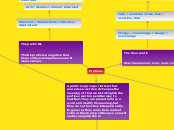by maria azuaje 8 years ago
351
prefijos
Prefixes are groups of letters added to the beginning of words to alter their meanings. In English, they function similarly to those in Castilian, originating from ancient Latin or Greek prepositions.

by maria azuaje 8 years ago
351

More like this
Paid / overpaid = pay / overpaid
Sleep / oversleep = sleep / oversleep
Lead / mislead = led / poorly led
Treat / mistreat = treat
Honesty / dishonesty = honest / dishonest
Ability / disability = ability / disability
Time / overtime = time, time / overtime, time
Heat / overheat
Grown / overgrown